Before you can launch your site, you need a domain (e.g., www.yourdomain.com)—and domain name ideas for business websites aren’t always easy to come by. Not only does it have to fit your brand to the dot, but it should also be sweet, short, and memorable. To help, we created a list of tips for different ways to choose the perfect domain name for your business’ website.
1. Get Ideas From Domain Name Generators
There’s a lot of competition when it comes to domain names (especially with .com or .net domain extensions), so it’s best to start with a long list of ideas for potential website domains. You can generate various domain name ideas for business websites for free with domain name generators—just type in your preferred domain name or keywords in the search box.
The generator will tell you if your domain name ideas are taken. It will also offer more suggestions for both the root domain (e.g., “fitsmallbusiness” in the example fitsmallbusiness.com) and top-level domains (TLD, e.g., “.com” in the example) as well as the cost to purchase each variant. The search is free, and you can purchase your chosen domain in just a few clicks.
Various domain name generators also offer low-cost options for domain registration. Here are three highly reliable business domain registrars to consider:
Domain Name Generator | |||
|---|---|---|---|
Cost of .com Domain | $9.99 / year | $1 the first year with 2-year registration | 1 cent the first year with 2-year registration |
Renews At | $9.99 / year | $17.99 / year | $20 / year |
Domain Privacy | $8.99 / year add-on | Included free | Free add-on |
Learn More |
2. Try Domain Name Ideas That Use Your Business Name
One of the first things to do when starting a business is building a small business website. To build a brand presence, choosing a website’s URL that directly reflects your brand can be the best option. Among other things, this means choosing a name that is consistent with your value proposition and your ultimate vision for the company.
Almost always, the best domain name ideas for business websites include the company name because it’s the most memorable representation of a business. Including your business’ name in its website URL makes it easier for prospects and customers to find your website and for your marketing to be consistent across the board as well.
An obvious example of this is Delta Air Lines, which uses www.delta.com. Not only is it memorable and easy to find, but they also keep it consistent in social media by reserving the handles (e.g., Facebook) under the same name.
3. Say What You Do
However, as more businesses move online, having a domain name that stands out to customers is more important than ever. Get noticed by potential clients by choosing a name for your website URL that is both catchy and informative.
UBreakIFix doubles as the company’s name and domain in the example below, cleverly describing the service while keeping the domain short, funny, and easy to spell. You can also experiment with everything from rhymes to unique traits or the ideal customer persona that is representative of your brand.
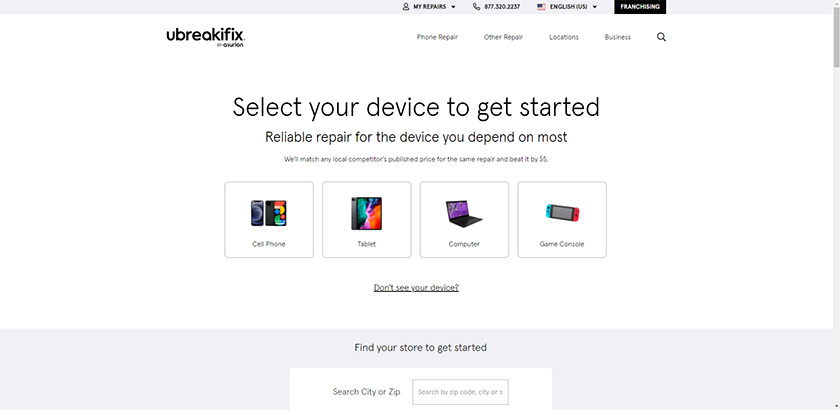
A URL like UBreakIFix is easily recognizable and remembered. (Source: UBreakIFix)
Another way to get inspiration for domain name ideas based on what your company does is to draw inspiration from your business mission statement. Check out our list of mission statement examples to get an idea of the types of selling propositions you could leverage.
4. Include Relevant Keywords
Keywords are an excellent way to come up with the perfect URL for your company. Although search engines like Google don’t put as much stock on keywords in domain URLs as they once did, it’s still a great way of telling your audience the services you provide.
If you’re unsure what keywords to use, try free keyword research tools. Just type in a word or phrase related to your business, and the tool will provide a list of related keywords people are searching for. Not only can this help improve your website’s search engine optimization, but it can also be a great source of ideas for your domain URL if you’re unsure where to start.
Pro tip: Keywords are only one way to optimize your website. Learn what it takes to rank higher on Google and other search engines.
5. Stick to Words That Are Easy to Remember
Once you’re noticed, successful marketing requires staying top of mind with your ideal customers. Having a name for your domain that is catchy and easy to remember can help, especially if you rely on advertising or word of mouth to build your business.
The same goes for spelling. While it’s tempting to use your name or a unique spelling, consider whether it’s something prospects and customers will remember when they’re searching for your business online. Sometimes the simplest domain name is the most memorable.
For example, a URL like www.KowalczyksKomputerRepair.com includes the owner’s name and describes the business, but some may find it difficult to spell, pronounce, or even remember. And, while the spelling of “Komputer” is a play on words, it’s likely to confuse someone searching for you online. In contrast, domain name ideas for business websites that are less than 15 characters long and spelled correctly are much easier to remember and find.
6. Consider Other Domain Extensions
Although .com is traditionally the most common—and most popular—domain extension, it’s not your only option when choosing a domain name. Moreover, it might not even be the most appropriate domain extension for your type of business. Extensions give information about your business, so if you’re not using a .com, make sure you choose the right extension based on your business type and industry.
Here are some common extensions and their industries:
- .com: Stands for “commercial” and is appropriate for all kinds of commercial entities
- .org: Stands for “organization” and is meant for use by nonprofits and charities
- .edu: Stands for “education” and is meant for use by educational institutions
- .net: Stands for “network” and is most appropriate for businesses in the technology sector
- .store: For any type of retail store, online store, ecommerce business, or online marketplace
Aside from these popular extensions, there are location-based extensions like .us (USA) and .ca (Canada) and niche extensions like .yoga and .shop. Using an alternative TLD extension can be an easy way to get the root domain you want without using a synonym or making other common adjustments. Likewise, alternative domain extensions are often less costly than their popular .com counterparts.
Did you know? Domain names were free until 1995, but now cost about $10 to $20 per year. A premium domain, however, such as marvelous.org or incredible.net, could cost you $7,500 or more for year one, before dropping down to a regular renewal price of $15 to $20 per year (source: IONOS.com domain name generator).
7. Research Competitors for Domain Name Ideas
When generating domain name ideas, researching your competitors can serve two purposes. First, it’s a great way to get a burst of inspiration and kick-start your creative process. Next, it will help identify blind spots in your marketing or niches that might be worth exploring in your business.
From there, you can craft some domain ideas for business websites that specifically address the needs of your target audience. Even if your business is well-established, it can still help you choose a domain name and learn something new about your industry.
For example, if you have a gluten-free bakery located in Asheville, NC, you might search for “gluten free bakery asheville.” Then, scroll through the local Google Business Profile listings to see what might be missing and what markets are already saturated. This can help you hone in on a niche or get inspiration for a fitting domain name that will stand out in your location.
8. Use a Thesaurus to Find Variations
If you’re like many business owners who chose a perfect option only to discover it’s unavailable or is too pricey, consider possible synonyms. Websites like Thesaurus.com and Power Thesaurus are excellent resources for choosing words to help your website’s URL stand out from the competition.
Where a simple synonym won’t do the trick, you can play around with unique alternative spellings or add a relevant adjective. Some business owners also choose to expand their search beyond English to secure a domain name that fits the bill. Just make sure it’s something customers can spell, pronounce, and remember.
9. Add a Location to Your Domain Name
If you’re set on a name that is already taken, consider adding your business location. Not only does this convey more information about your company to prospective clients, but it can also help you appear in more relevant online searches.
For example, the domain name www.luxurycleaningny.com reflects the name of the business, what the business does, and its service locations (e.g., in NY, or New York). Not only does this set the company apart, but its local clients are more likely to find it in an online search.
That said, if there’s a possibility your business will change location or expand to multiple offices, this may not be the best approach. Take some time to consider your long-term goals before going local with your domain name.
10. Get Specific—But Not Too Specific
It’s crucial to use a domain name that reflects your brand, but choosing a domain name that is too specific may not serve you as your business continues to expand and evolve. Aside from being too specific about your location, including a highly specific value proposition in your domain name can work against you.
For example, the domain name www.RestaurantSupplyNC.com tells your customers your business is a restaurant supply company based in North Carolina. But this domain name will no longer be relevant if you ultimately expand into additional services like hotel linen supplies or expand into other states.
Likewise, while choosing a domain like www.bracesonly.com may seem appropriate for an orthodontist, it’s also so specific that it sounds like the dental practice offers no other dental services. For that reason, a more general domain name like www.perfectgrin.com might be a better choice.
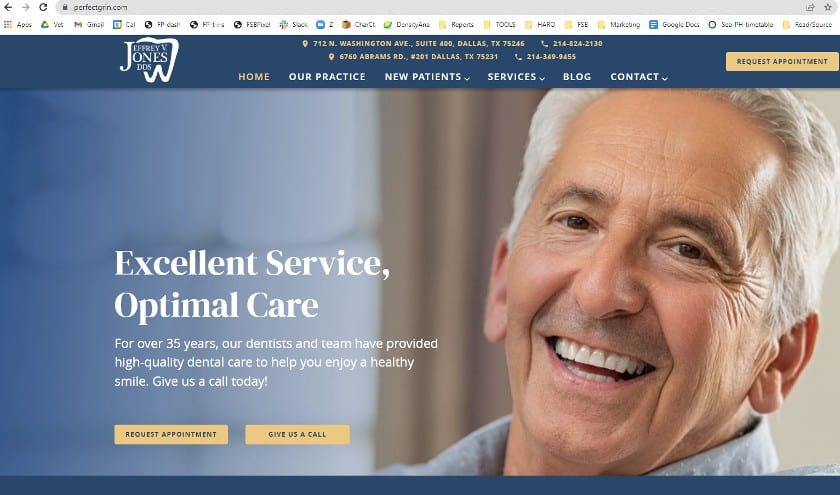
The domain name “www.perfectgrin.com” is perfect for a dental clinic. (Source: Perfect Grin)
11. Get Affordable Expert Help Coming Up With Ideas
Professional branding experts can help you discover ideas that are more memorable, succinct, and powerful than you can come up with on your own. Digital marketing agencies and consultants specializing in branding are plentiful. However, the cost of branding packages can be considerable. For an affordable option, check out the freelance professionals available on the Fiverr marketplace, with prices starting as low as $5.
Business Domain Name Examples to Inspire You
Still unsure what domain name to use for business? Check out the business domain name examples below that work amazingly with small businesses. Find out why they work and, hopefully, it will inspire your perfect domain name.
Thrivewellnesscenter.com
What makes Thrive Wellness Center’s domain successful is how it can communicate the business’ mission in its domain name: “thrive wellness.” It also gives off a sense of positivity, which is important for their line of work. Lastly, it’s straightforward and easy to remember, especially as it leverages the most popular top-level domain extension (.com).
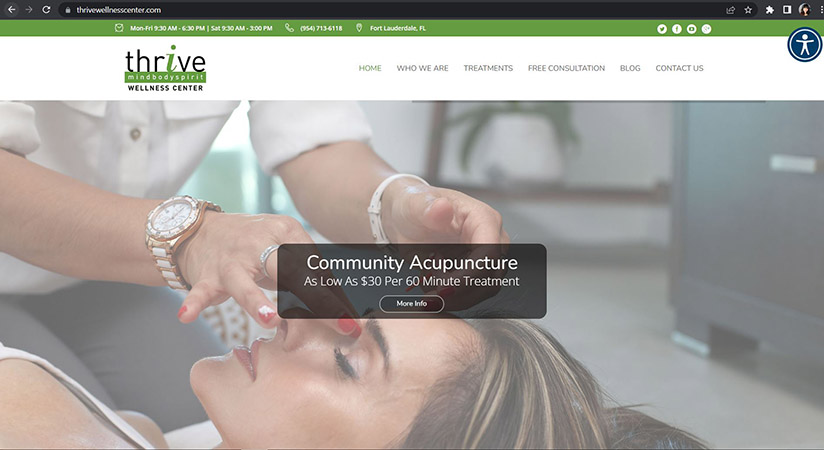
Thrive Wellness Center website and domain (Source: Thrive Wellness Center)
Heavenlyhoney.ca
Heavenly Honey uses a literary device called alliteration—meaning it is more appealing to its readers because of the repeated use of initial letters “heaven” and “honey.” This makes it memorable and rhythmic to say. On top of this, the word “heavenly” adds a positive connotation and communicates the quality of the product.
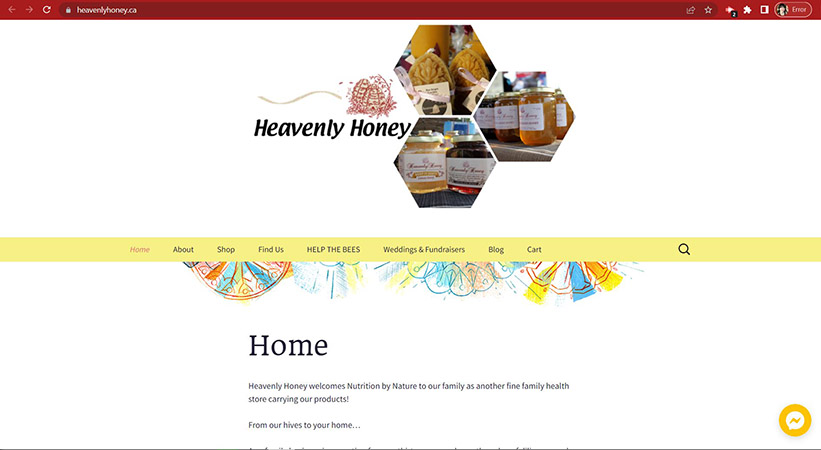
Heavenly Honey website and domain (Source: Heavenly Honey)
Coastalcruises.ca
Canadian-based Pacific Coastal Cruises & Tours uses a simplified version of their business name: Coastalcruises. It is short, easy to remember, and communicates the type of service the business provides. Despite its length, it is still able to maintain its brand quality with the word “coastal,” setting it apart from other cruise companies, and the .ca extension, which indicates the company is located in Canada.
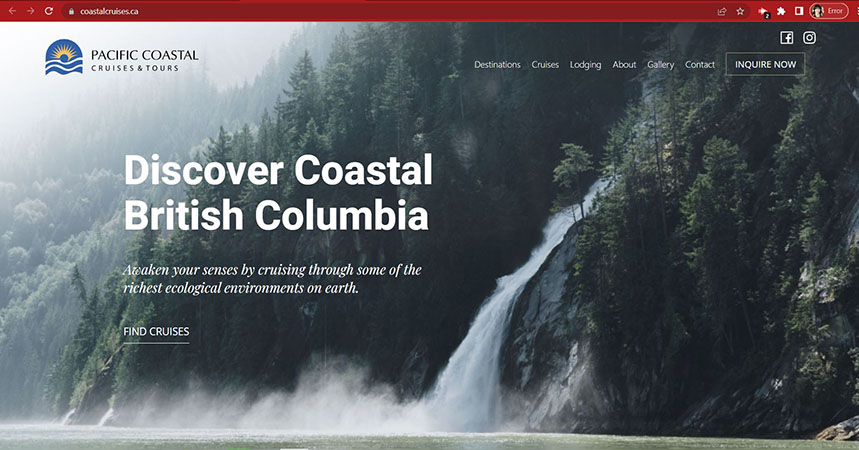
Pacific Coastal Cruises & Tours website and domain (Source: Pacific Coastal Cruises & Tours)
Lemonadedesign.co.za
If there’s one thing that creative studio Lemonade Design is able to express, it’s a sense of creativity. This domain name is memorable and communicates the style of the business. The word “lemonade” gives it a unique and playful quality that sets their brand apart. It uses the .co extension, which implies it’s a company, and .za, referencing its location (South Africa).
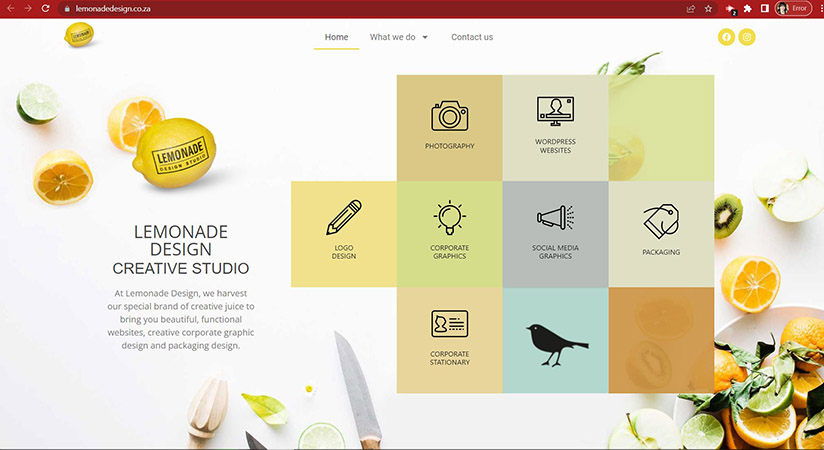
Lemonade Design website and domain (Source: Lemonade Design)
Pacificpaddle.net
Pacific Paddle rolls easily off the tongue with the repetition of “Pa” in both words used in the domain name. At the same time, “Pacific” is a locale-based trait for this business, making it recognizable to their customers. It uses a .net domain extension—learn the difference between .com and .net and which would be the best extension for your business domain.
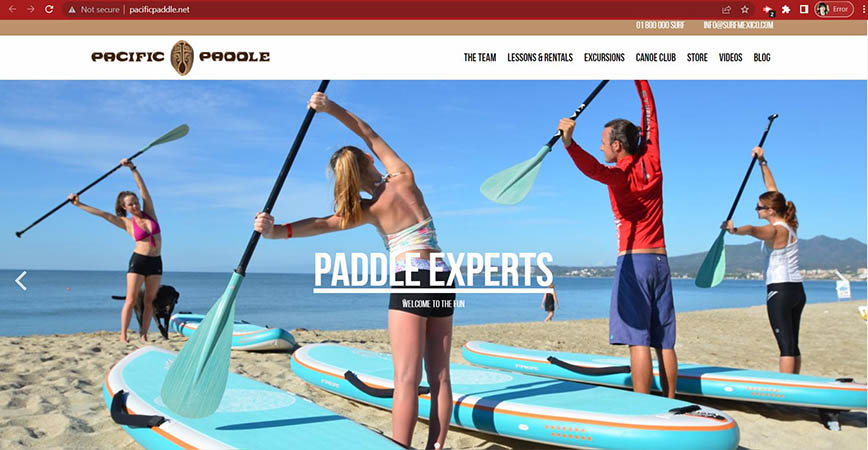
Pacific Paddle website and domain (Source: Pacific Paddle)
Frequently Asked Questions
What is a domain name?
A domain name is the internet URL your customers type into a web browser or search bar to find your business website. In addition to using it as a website URL, you can also use a domain name for business email to build brand presence and credibility online. Business domain name registration costs about $10 to $20 per year and can be completed in minutes.
Which free domain is best?
Domains you can get from free registrars like Freenom or DotTK aren’t top-level extensions (e.g., not .com or .net,). Hence, they look unprofessional and are less secure. The best way to get a free domain name is to look for services that include them, like web hosting, email hosting, or site builder plans. For example, IONOS offers a free domain in email hosting that costs $12 per year—less than the cost of domains with some providers.
How can I buy a domain name?
Once you have the perfect web domain idea, head to a domain name registrar like Domain.com or IONOS. When comparing the best places to buy a domain, look for features like cheaper prices for .com and other top-level domains as well as free domain privacy (private registration). Also, consider other services you need (like web or email hosting) that may include a domain for free.
Bottom Line
If you have a unique business name, choosing the right domain for your website might be a straightforward process. However, the first idea that pops into your head will often be taken. Luckily, the strategies above make it easier to brainstorm ideas to help you land the perfect one.